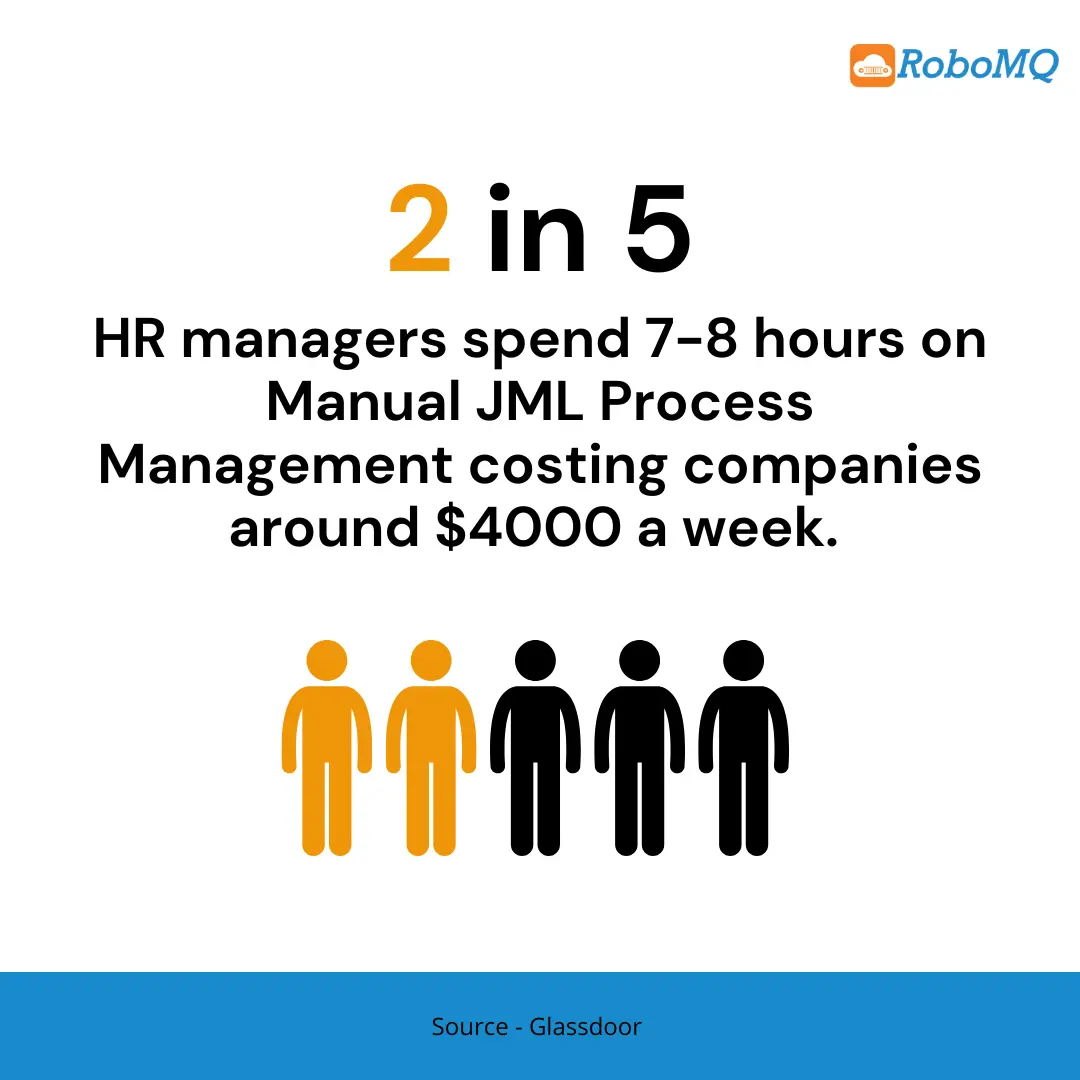The enterprise ecosystem today is changing at a rapid pace. Managed JML (Joiner, Mover, Leaver) process has become a necessity for growth and survival. It has become an operational backbone that directly impacts employee experience, enterprise security, and regulatory compliance. CIOs and CTOs are increasingly realizing that the existing gaps in their JML processes are creating operational inefficiencies, systematic vulnerabilities, and governance difficulties.
From the moment a new hire accepts the offer, a cycle of processes kicks in, consuming hours of HR & IT teams’ valuable time. Throughout their tenure, employees move roles, change departments, and get promoted, all of which must be carefully managed.
Take Laura, for example, an HR manager at a technology services firm based out of Richmond, Virginia. Her firm employs over 3000 employees based in 21 states and 5 different countries. Her collaboration with the IT team for employee lifecycle management is dependent on manual ticketing queues and shared spreadsheets. This often leads to delayed onboarding, a lack of clarity on role changes, and orphaned accounts with employees who have left the firm still having access. This is not just her story; it’s a case of a systemic problem across thousands of organizations around the world.

1. Onboarding Inefficiencies – Most enterprises today rely on disconnected identity management systems. Without real-time integration between HR systems and IdPs (Eg. ADP to AD or Google Workspace), 47% of new hires face IT setup delays, resulting in no work done during the first 15 days.
2. Mover Stage Risks – Due to a lack of integration between HR to IdPs, employee role changes are often met with access delays. Furthermore, enforcing contextual policies based on employees’ department, role, and location becomes difficult, leading to the violation of Zero Trust Principles.
3. Off-boarding Gaps – During offboarding, manual processes often miss access removal for third-party applications like Salesforce, GitHub, and Jira. Without audit-friendly deprovisioning, these ghost identities increase security breach risks and violate compliance standards.

1. Map the End-to-End Journey – Use automation solutions that can integrate your HR with AD and enable you to map different employee lifecycle stages. This includes profile creation, access provisioning, and resource and identity provisioning.
2. Adopt RBAC + ABAC – Implement role-based and attribute-based access controls to ensure dynamic user provisioning based on role, location, and device. This will help you enable the zero–trust, identity–first model.
3. Automate with Third-Party Integrations –Implement solutions to integrate your third-party applications with HR systems and IdPs. This will help automate provisioning, tracking changes, and enforcing consistent access policies across multiple systems.
3. Enable Continuous Audit Tracking – Enterprises need to move beyond periodic audits to automate role recertification, flag SoD violations and detect orphaned accounts. Using real-time dashboards can help improve the visibility of compliance gaps.
Selecting a scalable solution means choosing one that supports:
Full-Stack Integration with HRIS (Workday, SAP, ADP), IAM (Okta, Entra ID), ITSM (ServiceNow, Jira), and cloud apps.
Supporting SCIM, REST APIs, and webhooks, critical for last-mile provisioning to both modern and legacy systems.
Model complex logic, including dynamic approvals and nested hierarchies.
Audit-readiness under SOC 2, HIPAA, and GDPR.
Accelerate deployment and reduce configuration time.
When Laura’s company finally implemented Hire2Retire as an automation solution for their JML process management, the result was a near real-time, identity-first provisioning model that helped them:
More importantly, all access actions in her company were now logged immutably, ensuring visibility, auditability, and continuous compliance. New hires were now productive from day one, movers did not have to run from pole to pole for access, and leavers no longer posed security risks due to outdated permissions.
Laura’s experience highlights the strategic value of getting JML right. It is not just for operational efficiency, but for building a resilient, Zero Trust-ready organization.
To stay ahead, CIOs and CTOs must shift from fragmented, manual workflows to unified, identity-first automation. Hire2Retire can help you deliver a seamless JML orchestration. It enables the process of zero-touch provisioning, real-time updates, and policy-driven deprovisioning, empowering you to scale securely. Don’t let your traditional, flawed JML processes come in the way of your growth; automate today.
A JML process, is a set of procedures for managing the lifecycle of user identities within an organization. It outlines what an employee’s journey would look like from onboarding to off-boarding. It is crucial for managing employee identities and access within the organization, and ensuring that security, efficiency, and compliance are maintained.
A zero touch JML automates every stage of workforce lifecycle management. From identity provisioning based on HR triggers to dynamic access updates during role change and complete deprovisioning at exit, it encompasses everything. Furthermore, it reduces the chances of manual errors, helps HR-IT teams to focus on important tasks, and ensures that the processes are secure and compliant.
Hire2Retire offers simple, honest, straightforward, value-based, all-inclusive pricing starting at $5 per month per active employee. The actual price may vary depending on the volume of profiles and existing term discounts.

Abhishek Surtanya is a Marketing Manager with RoboMQ. He is a B2B and SaaS content strategist specializing in content writing that drives engagement, lead generation, and SEO growth. With 6+ years of experience, he has crafted high-impact content for top brands. He specializes in data-driven, conversion-focused content that establishes thought leadership and enhances brand visibility.

Abhishek Surtanya is a Marketing Manager with RoboMQ. He is a B2B and SaaS content strategist specializing in content writing that drives engagement, lead generation, and SEO growth. With 6+ years of experience, he has crafted high-impact content for top brands. He specializes in data-driven, conversion-focused content that establishes thought leadership and enhances brand visibility.